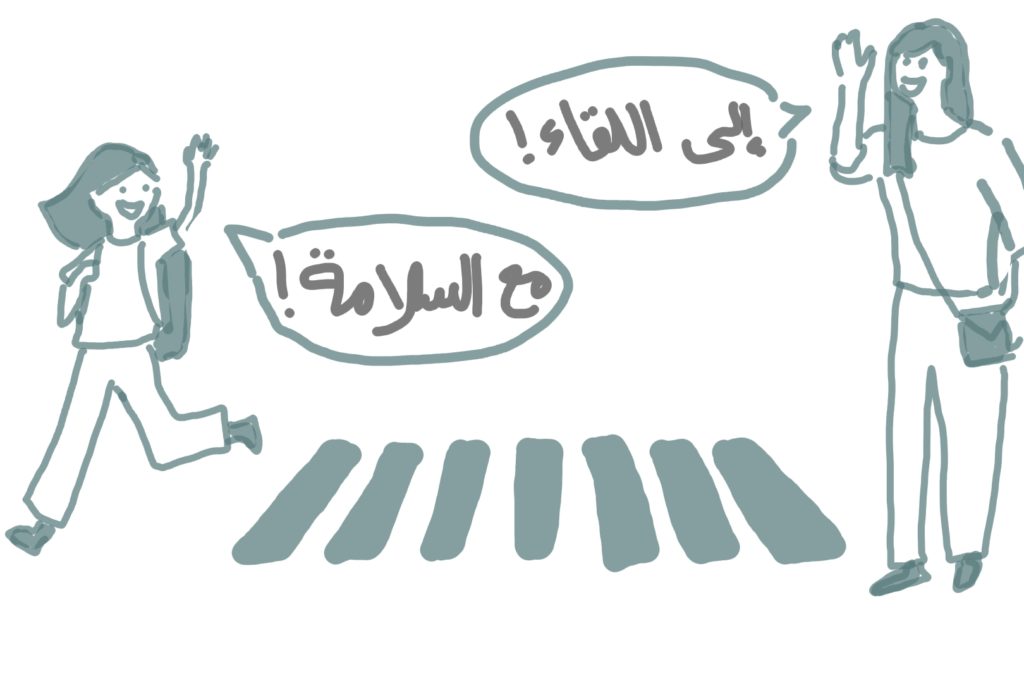الوداع Saying Goodbye in Arabic Posted by yasmine on Feb 2, 2022 in Arabic Language, Culture
In this post, we’ll look at the most common ways to say goodbye in Modern Standard Arabic as well as in Levantine Arabic.
✨If you were to part with someone and wanted to say goodbye in Arabic, which phrase comes to mind? How many ways to say goodbye do you know? Would you know which one to use, when, and with whom? When you word your goodbye, do you accompany your phrase with a handshake, hand wave, or a few kisses?
There are a variety of ways to wish someone goodbye from very formal in MSA to quick goodbyes in dialect. How to do so depends on your relationship with the person and the social situation.
Let’s begin with the most common way to say goodbye in Arabic used in both formal and non formal situations.
مع السَّلامة
Meaning “with peace/safety”.
السَّلامُ عَليكُم
Meaning “peace be upon you”. As well as a greeting, this phrase can also be used to bid someone farewell. It is a formal way to say goodbye and always the safest choice with people you briefly come in contact with such as cab drivers, officials, or sellers at the market.
وداعاً
Is very formal coming from the word وداع which is literally the act of saying “goodbye” or “farewell”.
إلى اللقاء
Meaning “see you later” or “till our next meeting”.
✨There is no need to decline these depending on gender, singular or plural.
الله معك
“May God be with you”. This is another common way to say goodbye. Works in both formal and informal contexts. Sometimes it’s added to other goodbye phrases or said on its own. You’ll need to conjugate this phrase.
الله مَعَك (male)
الله مَعِك (female)
الله مَعْكُم/مَعْكُن (plural)
باي
This is an informal way to say goodbye. Think family and friends. As you know, the word “bye” has become universal. Arabs sometimes say “bye” on its own, or attached to other goodbye phrases for example,
باي، مع السلامة
When Arabic speakers are ready to leave they often say يلا as in “let’s go” then they attach باي making it يلا باي.
أراك
بشوفك
Meaning “I’ll see you”. أراك is standard Arabic and sometimes used in spoken Arabic. بشوفك is strictly dialect. Sometimes the phrase إن شاءالله meaning ” God willing” is added after. Remember to conjugate.
أراكَ (male)
أراكِ (female)
أراكُم (plural)
بشوفَك (male)
بشوفِك (female)
بشوفكُم/بشوفكُن (plural)
يِعْطيك العافْيِة
Meaning “May God give you good health.” If the person you are saying goodbye to is working on something, saying يِعْطيك العافْيِة is very polite. You can say this to your mother as well as your manager or a new acquaintance. You are leaving them to continue with their task and you wish them health in doing so. Their reply would be
الله يعافيك
Wishing them good health as well.
Sometimes words are enough, but if you’re saying goodbye to someone close, a gesture can go with it. With family members and close friends, kisses on the cheek are almost always expected. Unless close family members, this usually occurs strictly between people of the same gender.
A goodbye handshake between opposite genders depends on one’s personal preference. If you don’t mind, it’s best to wait till the other person puts their hand out first for a handshake. If they don’t, put your hand over your heart as you say goodbye. This of course applies to greeting someone as well. Standing up to say goodbye when someone goes to leave the room is considered polite and respectful especially if the person leaving is older than you are.
I hope you found this post to be a handy reference for saying goodbye in Arabic. Till next week, happy Arabic learning and
إلى اللقاء 😊

Keep learning Arabic with us!
Build vocabulary, practice pronunciation, and more with Transparent Language Online. Available anytime, anywhere, on any device.





Comments:
Ivan Karabasov:
Dear Yasmine,
just a grammatical remark: it would be more correct to say “decline” rather than “conjugate”, as you are inflecting the suffixes for case, number and gender.
Regards,
Ivan
Mohamed:
Excellent post. Clarified certain phrases for me. Really enjoyed you blogs.